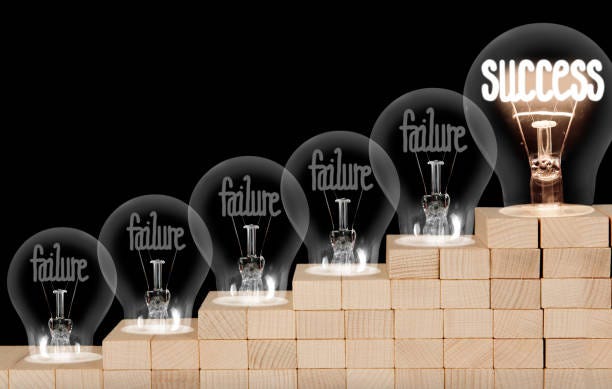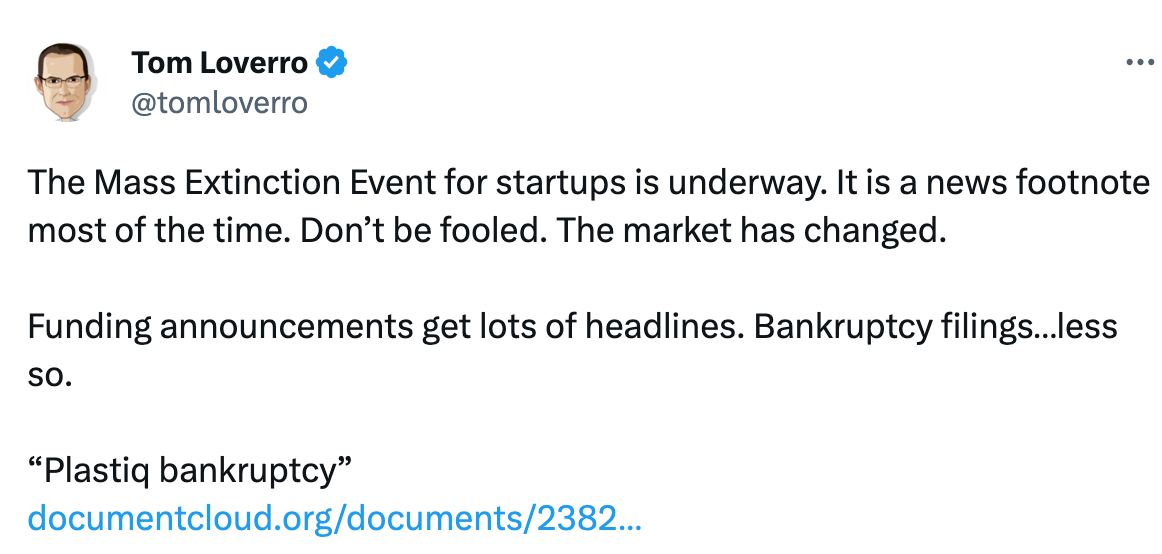Why care about failure?
90% of new businesses fail. Why do we insist on only learning from the 10%?
If the average outcome for a start-up is failure, and the risk of failure is so high, why the hell do we do this to ourselves? Entrepreneurs need to hold two concurrent thoughts at the same time.
The first thought: “Rob… this is more than likely going to fail”
The second thought: “But that won’t happen to us - we’re unicorns baby.”
I often shared this with new founders to help them perform their own fun mental gymnastics. I have to admit, holding two contrary thoughts in your head at the same time is exhausting.
I’ve learned from experience that we have funny feelings toward failure. For some it’s a badge of honor, for others it’s a great source of shame. One thing is certain -for the majority of founders, failure is inevitable. I believe that failure is an absolute gold mine.
“The only real mistake is the one from which we learn nothing.” - Henry Ford
Everyone loves a winner
In many ways, Silicon Valley has a survivorship bias or a “winners bias” - we like to focus on unicorns, swap stories about the runaway successes.
“Yes, Mr Cap Table, we’ve all heard about the Airbnb founders selling breakfast cereal… No Mr Cap Table, I don’t believe that’s how I’ll succeed.”
And yet, this relentless focus on success doesn’t stack with the economics of VC.
Research from Cambridge Associates shows that as an industry, VCs pick winners only 2.5 percent of the time. Out of more than 4,000 VC investment rounds annually, over the course of a decade the top 100 generate between 70 and 100 percent of industry profits.
That’s in the good times, before the current “extinction level threat” to start-ups that was highlighted by Tom Loverro of IVP.
While the word “extinction” is perhaps a little over-dramatic. But Tom’s not wrong. Many many founders have reached out since my first newsletter came out. It sounds like a lot of companies are headed toward failure, or at least (for the first time) seriously contemplated it.
So why spend time dwelling in the topic?
Here are my theses on why failure deserves to be more deeply explored:
a significant amount of the embedded learnings in start-ups exists in the 90% of companies who weren’t runaway successes.
start-ups return more than just return on investment to funds. Start-ups create significant investments in human capital, innovation and soft power.
if we think about it early, as a chance, a probability, we might be able to optimize for better financial outcomes and a soft landing for ourselves and out team.
There’s thousands of case studies about runaway successes, but we do little to catalog our lessons learned.
Imagine having access to every lesson learned from every start-up that’s been created in the last decade. How might it change your strategy? What might you do differently?
Investors like “second time founders” for the very reason that they have failed (on other people’s money…) So starting next week we’ll spend some time demystifying failure with our first founder Q&A.
We’ll ask questions like: “When did you know the writing was on the wall?”, “What do you wish you’d done differently?”, “How are you feeling about it today?”
We’ll also start defining what a soft landing is.
Thank you and contributions
I owe thanks to some folks who’ve contributed since I shared my first post:
The wonderful Jen Tescher from Financial Health Network (an investor in Daylight) who pointed out that the majority of start-up leaders are (still) men and that our hero image of a young woman falling on her face wasn’t representative of the VC ecosystem. Thank you!
My good friend Carlos Ariel Missirian, a former founder himself who helped with some early feedback.
Javier Senosiain - an old friend from London who checked in on my throughout the last few months. Javi - these little moments were priceless. Thank you!
The various friends, founders and investors that are cheering me for my first writing gig. You know who you are.
If you’d have questions for other founders, would like to share your thoughts or experience, and importantly if you’re worried about your fundraise / runway let’s chat.
I’d be happy to lend an extra set of hands to help you feel more in control of all scenarios by having a light-touch plan ready we’ll before it’s needed.



